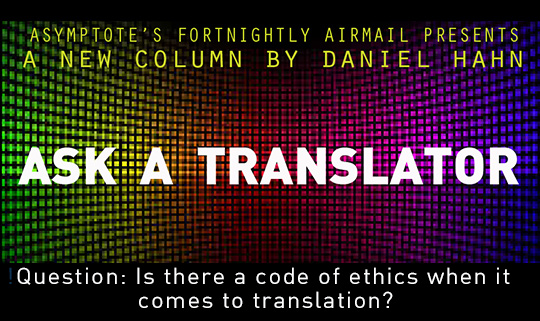Our literary translator on the street, award-winning writer and editor Daniel Hahn, is back with another installment of “Ask a Translator,” the monthly column responding to readers’ deepest questions about the day-to-day practice of literary translation. This time around, Asymptote reader Mandy Doll from Singapore asked the following:
Is there a code of ethics when it comes to translation?
This is how the world looks today, according to the evening news:
• Militant groups kill dozens in Brussels bombings!
• Britain’s campaign to split from the E.U. heats up!
• Trump and G.O.P. rivals escalate anti-immigrant rhetoric!
These are stories of division.
They are stories of a failure of empathy, a failure of imagination. Stories of willful misunderstanding. Stories that tell us how the powerful capitalise on failed media and failed education systems to persuade the powerless that the only thing that really matters is how people are different, not how they are the same.
Every assumption that underpins the translator’s work is in opposition to this. Translation is optimistic. Translation is generous. Translation assumes that—however unlikely—mutual understanding is possible. Translation says, Listen—see that guy over there? Give him a chance, ’cause what he’s saying is worth hearing. Translation assumes that my story can mean something to you, that her concerns way over there are not fundamentally different to his worries over here. Come to that, doesn’t all literature make that assumption?
It would obviously be grandiose and, well, silly to suggest that something as marginal as literary translation can fix all the big problems, heal the world, peace and love, everyone . . . But I do believe in the great, activist, essential good-ness of the beliefs underlying it. Just as you won’t be surprised to learn that I believe in the power of reading to broaden horizons, to raise questions, to challenge dogmas, to expand empathy . . . and yes, it’s banal to say that reading can do these big vague things, it sounds trite and hollow, but I’ll take the risk of sounding vapid because the stakes are so high and those big vague things are all things we need today, so desperately.
You’ll notice I haven’t answered your question, but if I’m honest, I don’t know how.
Well . . . O.K.
One easy answer: Personally, I wouldn’t translate anything I thought was toxic. Free speech is important to me, and I may not want actively to ban or silence a writer or text I despise, but I’m damned if I’m going to be an accessory. This assumes that somewhere along the way I’m making a simple moral judgment, of course.
And another easy answer: As a translator, I feel some responsibility to the writers I translate, and judge the standard of my behaviour according to the quality of my respect for them. Sure, I owe some responsibility to my readers, too, and to the publisher who commissions and pays me, but even that comes back down to the honesty with which I approach my task of representing a writer’s work in my own words. My behaviour towards my writer and her work might be good behaviour or it might not; I can act towards her with integrity, or in bad faith. And yes, these are moral evaluations, too.
I’m pretty confident most of my fellow translators would agree, broadly speaking, with both of these all-too-easy answers. Most of us would feel queasy translating fascist propaganda. Most of us would feel guilty if we knowingly traduced a writer who was kind enough to trust their precious, fragile little book to our hands. All this is well and good. But these are not satisfactory answers to your question. To my mind, these can only be descriptions of personal boundaries, red lines which each translator draws particularly for himself, not fixed limits or expectations defined from outside. The way I see things, no, other than the limits we impose on ourselves, there aren’t firm codes of conduct—art doesn’t respond well to such things.
I guess my answer’s “no,” then.
Yet I do feel comfortable talking about translation as fundamentally connected to a moral good, however embarrassingly self-important that may sound. Which is not to claim that translators are inherently more likely to be driven by a strong moral code than anyone else. Naturally we’re every bit as mean-spirited and craven as the rest of you. We see those headlines and get angry, or succumb to despair. But whether or not we’re actually propelled by an optimistic view of the good that’s to be found in other people, the occupation itself does depend on such assumptions. The work of translators—like it or not—brings people together, and to my way of thinking that is A Good Thing. And translation doesn’t merely demand a belief in honesty and generosity and empathy, it’s a symptom of those things, too. As I said, the beliefs in which it is rooted are, in the abstract, good ones, but I don’t think these beliefs mean I have any particular incontrovertible moral imperatives as a professional translator. Rather they’re a reminder of something far bigger and far simpler, that I have those moral imperatives as a human being, and the power to act on them. We can all do more.
*****
Got a translation-related question for Daniel Hahn? Send it to us at askatranslator@

